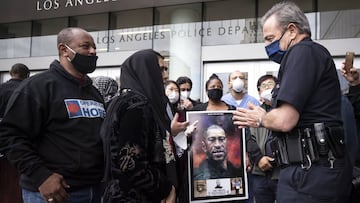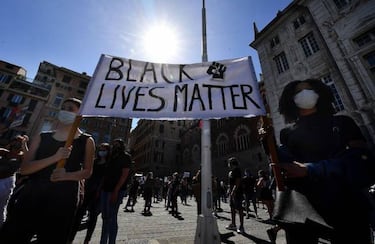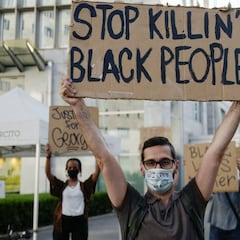George Floyd protests: is kneeling on the neck a legal police tactic?
Minneapolis banned the use of choke holds on 5 June after the death of George Floyd and most police departments do not permit the practice to detain suspects.

The death of George Floyd in Minneapolis on 25 May has sparked protests across the globe against the treatment of African-Americans at the hands of the US authorities and it has also led to debate about the permitted methods used by US law enforcement officers when detaining suspects. The question being asked by experts and the general public at large is: was the neck hold and body restraint used on the unarmed 46-year-old by police officers Derek Chauvin, J. Alexander Kueng, Thomas Lane and Tou Thao legal?
Minneapolis use of choke holds prior to George Floyd case

In Minneapolis, law enforcement officers were permitted to employ two types of neck hold (carotid neck restraints) on a potential suspect, according to the department’s Policy and Procedure manual, but only officers who have received specific training in how to correctly carry them out are permitted to do so.
However, former police officer and co-founder of the Police Policy Studies Council Tom Aveni, who has been involved in training law enforcement officers since 1983, told USA Today: "I have not seen anyone teach the use of a knee to the neck.”
The Minneapolis Policy and Procedure manual describes two types of neck restraint police officers can deploy: Conscious neck restraint (putting light pressure on the subject's neck with an arm or leg without cutting off their airway) and unconscious neck restraint (applying enough pressure on a subject to make them lose consciousness without killing them).
Conscious neck restraint involves putting light pressure on the subject's neck with an arm or leg without cutting off their airway, and unconscious neck restraint puts enough pressure on a subject to make them lose consciousness without killing them, according to the manual. It can only be justified if a suspect if acting aggressively or resisting arrest. Even so, when a suspect has been handcuffed and subdued, the hold must be released immediately, according to experts.
Minneapolis police officers have used neck restraints at least 237 times and rendered people unconscious 44 times since 2015, according to NBC News. Minneapolis police officials told NBC that this hold is neither sanctioned nor taught at the Minneapolis PD.
California moves to ban carotid holds
Thank you @SupJaniceHahn! https://t.co/mRDGeO7iMy
— Asm. Mike A. Gipson (@AsmMikeGipson) June 5, 2020
In California, Department of Justice data showed that across the state between 2016 and 2018 officers seriously injured 103 people while using carotid neck restraints. Two people were killed and 91 left unconscious, according to a report in the Los Angeles Times.
The practice is widely condemned and banned in most US states and cities.
The same report noted that Department of Justice guidance on use of force says: "unexplained in-custody deaths are caused more often than is generally known by a little-known phenomenon called positional asphyxia," when someone cannot breathe in a certain position.
The Department of Justice’s official advice is: "As soon as the suspect is handcuffed, get him off his stomach.”
California State Assemblyman Mike Gipson championed a bill introduced on Friday to ban the use of carotid holds across California.
David Smith case a precedent for George Floyd
BREAKING: Minneapolis City Council unanimously votes for immediate reform within the city's police department, including banning chokeholds. https://t.co/9L7Nit1GVI
— ABC News (@ABC) June 5, 2020
Related stories
The George Floyd case is not without precedent in Minneapolis. In 2010, 28-year-old David Smith died after an officer pinned him down with a knee to the back for about four minutes. The city settled a lawsuit for $3 million, said Robert Bennett, a Minneapolis attorney who represented Smith's family, according to USA Today.
Reaction to the George Floyd case has been swift. As well as California, authorities across the US have introduced measures to prevent the use of carotid holds. In Minneapolis, a law was introduced on 5 June banning choke holds and ordering other officers to intervene if a fellow officer is employing one.

